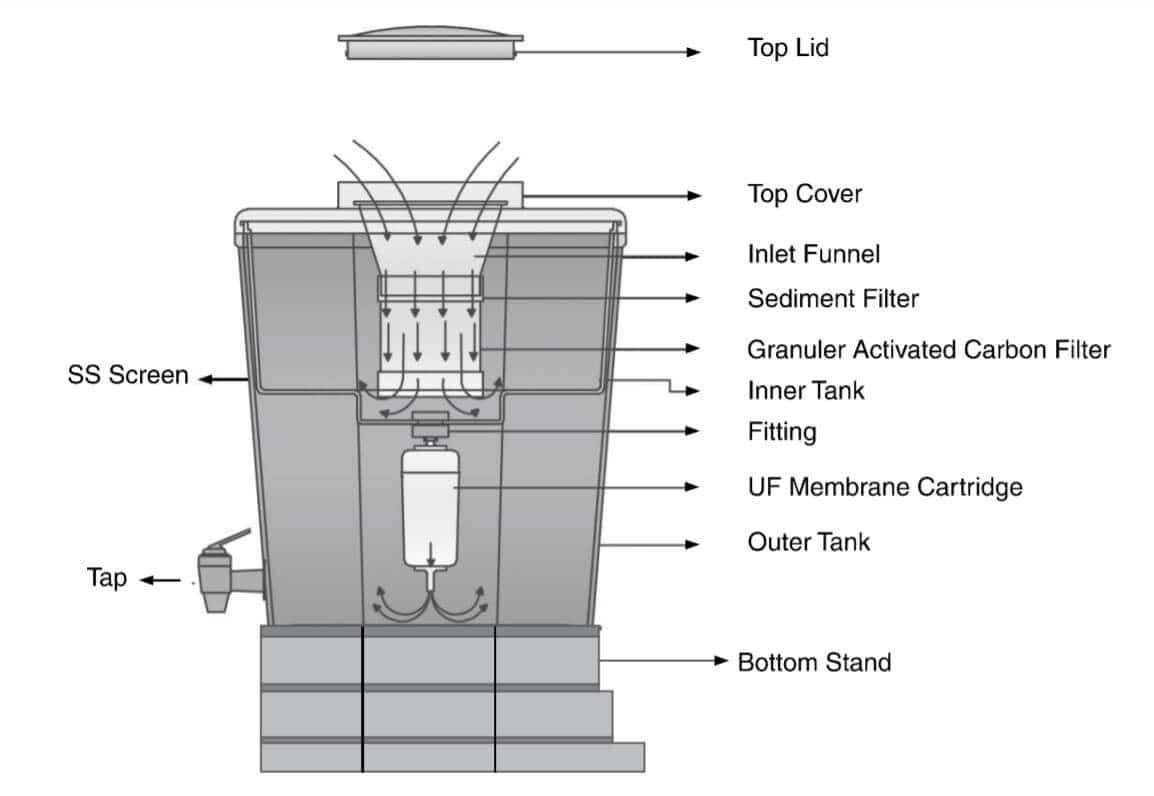Gravity Based Water Purifiers – When to Use, Pros & Cons
We have a small challenge for you; read the following situations without relating to any one of them:
- You are concerned and unsure about the purity of the water you and your loved ones drink.
- The purity of the water supply to your home is questionable, despite all municipality assurances.
- Using a groundwater source? The excess mineral content and heavy metals are a big concern for you.
- You wish there were a reliable, safer way to purify and drink water from whichever source you get it.
India, in the last few years, has made great progress in providing access to clean piped water supply to areas that remained neglected for decades.
Under the Jal Jeevan Mission, India is working on an ambitious target to ensure Har Ghar Jal (piped water supply) to all rural households by 2024.
We hope and truly wish that India meets this mammoth target.
Talking about the present scenario, a sizable chunk of the Indian population does not have easy access to safe water at present.
With the increasing concerns about access to pure, potable water, many recent technological advancements have provided practical solutions. The concerns revolve around the fact that unclean water could lead to long-term health problems.
Water purification systems play a vital role in keeping you safe from water-borne diseases. Water purifiers are broadly categorized into two types:
- Electric Water Purifiers
- Non-Electric Water Purifiers
This blog post will elaborate on gravity-based water purifiers – when to use, pros & cons.
Keep reading!
What are Gravity-Based Water Purifiers?
As the name suggests, these water purifiers work using gravity as their working principle. In gravity-based purification, water is allowed to flow from a top container (stores input water) to a lower container (stores filtered water) under the effect of gravity.
They fall under the non-electric water purifiers category because they do not need to be connected to any power source to purify water. Instead, they use activated carbon and UF (Ultra Filtration).
A fibre mesh or polishers are also used sometimes. Activated carbon absorbs impurities, parasites, chlorine, or pesticides in the water. The fibre mesh is more like a physical barrier to stop dust or particles contaminating the water.

The UF system differs from the RO system because of the bigger pore size in the membrane. However, it is small enough to filter out bacteria and cysts from your water supply. Overall, the UF system is the best option if you are going for a gravity-based water purifier.
Confused why there are so many different water purification technologies? Read – what’s the difference between several water purification technologies?
When Should You Use Them?
Now, the question we must ask is whether gravity-based water purifiers are worth a shot in India, especially where you live. Firstly, if you live where the electricity supply isn’t constant, gravity-based water purifiers are the way to obtain safe water to drink.
Alternatively, if you have a municipality or corporation water supply at your home, a gravity-based water purifier is enough as the water is already chemically purified. Overall, these are safer than drinking boiled or chemically purified water.
Important Article – Not sure which water purifier to choose? Have a look at this detailed guide that maps water purification technology according to water quality.
When to Skip
But whether or not a gravity-based water purifier is a suitable option for you also depends on the TDS of the water supply you get. Even with a UF system, a gravity-based water purifier will not filter out any heavy metals present in the water.
If the TDS (Total Dissolved Solids) meter reads lower than 200-300, these water filters work just fine. Essentially, if there are physical impurities like dust or dirt and the TDS level is suitable for drinking, only then should you opt for a gravity-based water purifier.
Useful Read – How to check the TDS level of water at home?
Pros and Cons
Final Verdict
Safe water to drink is essential for one’s health, as contaminated water can cause many waterborne diseases. Hence, it is better to use a gravity-based water purifier rather than not use any filter.
A gravity-based water purifier disinfects the water better than just boiling it. It works well for eliminating physical impurities but does not work for more contaminated water that has harmful metals.
If you are planning to buy a non-electric purifier then you may want to check out the 10 best non-electric water purifiers.
We suggest you check the quality of the water supply at your home before buying one.



